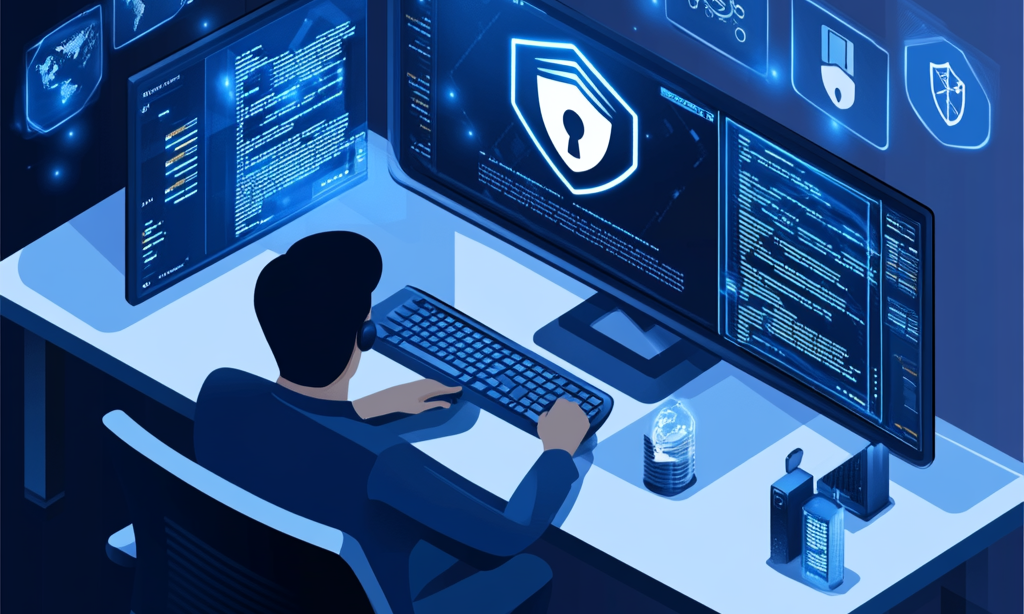In the contemporary digital era, cybersecurity is of high priority for small and large enterprises. Due to the evolving nature of cyberattacks, organizations must be vigilant to secure their systems and data.
One of the most significant decisions businesses make is whether or not to utilize a 24/7 Managed Security Operations Center (SOC) or develop an in-house security team. Each of them has strengths and weaknesses, and understanding the variations can help you make the best decision for your enterprise.
In this article, we will compare the advantages and disadvantages of a 24/7 managed SOC and an in-house security team, providing you with information on cost, efficiency, scalability, and more.
What Is a 24/7 Managed SOC?
A 24/7 Managed SOC is an outsourced security service that monitors and manages an organization’s security around the clock. The primary function of a SOC is to identify, deter, and react to security intrusions, such as cyberattacks, breaches, and system vulnerabilities. Managed SOC services are typically outsourced to security specialist firms with the expertise and technology to perform complex security work.
A 24/7 SOC provider offers comprehensive security coverage, with continuous monitoring and rapid response to incidents, without having to force firms to hire their own dedicated security personnel. The service is particularly useful for firms that lack the capability or resources needed to manage cybersecurity in-house.
What Is an In-House Security Team?
An in-house security team is employees directly employed by the company to manage and operate its cybersecurity infrastructure. They work from the company’s offices and are responsible for network security, incident response, vulnerability management, and other security operations.
An in-house staff can consist of security professionals like network administrators, cybersecurity analysts, and engineers, all working together to ensure the organization’s systems are secure. Even though having an in-house staff gives immediate control over security operations, it can also be problematic with high personnel expenses, sparse coverage, and resource availability challenges.
Benefits of a 24/7 Managed SOC
1. 24/7 Coverage
One of the most significant advantages of a 24/7 managed SOC service is the continuous monitoring and protection it offers. Cyber threats are constant, and businesses must be vigilant at all times. A managed SOC provides round-the-clock surveillance to detect and respond to threats as soon as they arise, ensuring that there are no gaps in coverage.
With a 24/7 SOC provider, you can rest assured that your network is being monitored by experts, even during off-hours, weekends, and holidays. This level of coverage can prevent potential breaches that may go unnoticed if relying on an internal team that works during standard business hours.
2. Cost-Effectiveness
Building an in-house security team can be expensive, particularly for smaller organizations. As much as hiring experienced cybersecurity professionals, buying the necessary security tools, and keeping them trained and certified round the clock can be expensive, in-house teams can also require significant infrastructure costs to create the necessary systems for managing and monitoring security.
On the other hand, a 24/7 SOC service offers a less expensive alternative. When you outsource security monitoring, you remove the costs associated with employing, training, and retaining a full-time in-house team. You only pay for the needed service, typically on a subscription basis, which is easier on the budget while you continue to enjoy best-in-class security.
3. Expertise and Experience
A 24/7 managed SOC is staffed by experts who specialize in cybersecurity. These providers are typically staffed with highly trained analysts, engineers, and incident responders who are constantly updated on the latest threat intelligence and security technologies. They have the experience and expertise to respond to incidents quickly and effectively, minimizing potential damage to your business.
For businesses without a dedicated cybersecurity department, leveraging the knowledge and experience of a 24/7 SOC provider can be a game-changer. The provider ensures that your security operations are in good hands, with access to the latest tools, techniques, and best practices in the industry.
4. Scalability
As your business grows, so do your security needs. A 24/7 SOC service is highly scalable, making it easier to adapt to new challenges and expanding demands. Whether you’re adding new locations, services, or data, a managed SOC can quickly scale its resources to accommodate your growth without requiring additional personnel or investment in infrastructure.
In-house teams, on the other hand, may struggle to scale effectively without significant additional investment. This can lead to delays in security coverage and may require hiring new staff, which increases costs.
Benefits of an In-House Security Team
1. Direct Control
One of the primary benefits of an in-house security team is the level of control it offers. With an internal team, you have direct oversight of your security operations and can tailor your approach to fit the specific needs of your business. This can be especially useful if you have very specialized requirements or if your organization handles sensitive data that needs extra layers of protection.
With a 24/7 managed SOC, you rely on an external provider to handle your security, which may feel less secure for some businesses that prefer to have full control over their operations.
2. Customization and Integration
In-house teams can fully integrate security measures into the company’s internal processes, applications, and systems. This level of customization allows for a tailored security approach that is deeply embedded within the company’s operations. If your business operates in a highly regulated industry or has specific compliance requirements, an in-house team may be better suited to ensure that these needs are consistently met.
While a 24/7 managed SOC service can be customized to an extent, the level of integration and alignment with internal systems may not be as seamless as with an in-house team.
3. Familiarity with Company Culture
An in-house team is part of your organization and will have a deeper understanding of your company’s unique needs, culture, and goals. This familiarity allows them to provide more context-specific insights and faster responses to incidents. Additionally, in-house teams may be more flexible and able to respond more quickly to emerging threats or requests from other departments.
However, the disadvantage is that in-house teams might not have the same breadth of exposure to industry-wide threats that a 24/7 SOC provider may have due to their specialized role across many clients.
24/7 SOC Service vs. In-House Security Team: A Cost Comparison
In comparing the expense of a 24/7 SOC with the expense of having an in-house staff, there are several things to keep in mind. For an in-house staff, salaries, benefits, training, and maintenance costs of the security system have to be added up. For a small or medium-sized business, the expense of creating an effective in-house security staff can quickly amount to tens of thousands of dollars a year.
In contrast, a 24/7 SOC service is typically subscription-based, which is potentially more affordable, especially considering the high cost of hiring and retaining cybersecurity experts. Managed SOC firms typically have variable pricing based on the size of your company, the level of services required, and the level of monitoring intensity. While the cost is variable, a 24/7 SOC vendor will offer a more predictable and easier-to-manage expense.
Choosing the Right Option for Your Business
Key Considerations:
- Budget: If cost control is a priority, a 24/7 managed SOC service is often the more economical choice, as it eliminates the need for a large security team and the associated costs.
- Expertise: If your organization requires specialized cybersecurity knowledge or operates in a high-risk environment, an in-house team may provide the expertise needed.
- Control: If maintaining complete control over your security operations is essential, an in-house team offers more direct oversight.
- Scalability: For growing businesses or those experiencing fluctuating security demands, a 24/7 SOC service offers the flexibility to scale quickly.
Conclusion
Both an in-house security team and a 24/7 managed SOC have their own strengths and weaknesses. A 24/7 SOC vendor offers expertise, 24/7 monitoring, and scalable cost-effectiveness, which is perfect for organizations that wish to improve their security without the exorbitant overhead of maintaining an internal staff. Yet, an in-house team provides direct control and customization, which can be critical for highly specialized organizations.
Ultimately, the optimal choice will depend on the scale of your business, security needs, budget, and long-term goals. By taking proper consideration of these factors, you can determine the most suitable choice for your business, as your cybersecurity will remain robust and effective.


